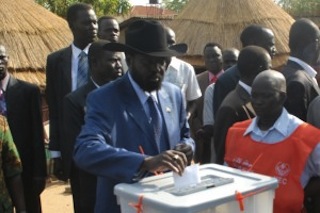South Sudanese official hints at possibility of extending national unity government mandate
August 15, 2017 (JUBA) – A South Sudanese presidential adviser has unexpectedly hinted on possibilities of extending the mandate of the transitional government of national unity, arguing that some key provisions within the 2015 peace agreement are yet to be fully implemented.

“The government actually wants full implementation of the peace agreement so that people can go for elections to make their own choices during the elections, but given the way the implementation processes have been conducted, it gives you an impression that the transitional period could end without fully implementing key provisions”, he said.
The aide hinted on possibilities of extending the transitional period should parties to the peace accord fail to complete implementation of its key provisions within the specified period of the agreement.
According to the presidential advisor, the parties to the peace deal and stakeholders were working together at different levels to ensure all outstanding issues in the accord are sorted out and implemented.
The assembling and integration of other forces into the national army is one of the key areas considered by the main parties as a priority.
CALL FOR ELECTION PREPARATIONS
President Salva Kiir on Monday urged the hold out armed and political opposition groups to stop fighting and prepare themselves for the general elections expected at end of the transitional period.
President Kiir made the remarks at a meeting with Koma and Gajaak communities in Juba, during which he called on traditional leaders of the two communities to unite and move forward together in order to overcome the challenging security situation in the country.
“There is nothing you will gain in splitting Maiwut or moving away from Maiwut and go to another area. You have to understand that your union has a lot of strength than division,” said President Kiir.
He further asked the communities to reconcile and embark on a peaceful sensitization campaign to bring people in the area together.
The South Sudan leader further called on the country’s population to embrace peace, reconciliation, forgiveness and unity, stressing that such needs prompted his launch of the national dialogue process which should allow them discuss together matters of the future.
“We are now calling on the people who are still advocating for war to denounce violence, stop fighting and come back to participate in the dialogue process so that people go for elections after the end of the transitional period. Elections will people give an opportunity to make their own choices,” stressed Kiir.
Last week, South Sudan government forces captured the rebel stronghold of Pagak, after a series of attacks and counterattacks.
The government now plans to use this victory to generate a new dynamic to discourage those who joined the rebellion or the opposition hold-out groups to join the national dialogue process.
In April last year, tour factions of the South Sudan’s former warring parties and political rivals-turned peace partners formed the long-awaited transitional government of national unity to administer the young nation for the next two and a half years, pending elections.
The rival parties agreed to form a unity government and implement reforms in the country, in accordance with the implementation of the power sharing deal in the Agreement on the Resolution of the Conflict in South Sudan (ARCISS) brokered by the East African regional bloc, the Intergovernmental Authority on Development (IGAD), and its continental as well as international partners.
The rival parties in the coalition included the government led by President Kiir, the armed opposition faction of the SPLM-IO led by former First Vice President, Riek Machar, the Former Detainees (FDs) led by the now appointed Foreign Minister, Deng Alor Kuol, acting chairperson on behalf of Pagan Amum, former SPLM Secretary General, and Other Political Parties (OPPs) led by Lam Akol, Chairman of the Democratic Change (DC) party, who also chairs the alliance of opposition political parties in South Sudan.
Each faction nominated officials who were appointed to the ministerial positions based on the number of portfolios allocated in the power sharing deal. The Juba government was allocated 16 national ministers, the armed opposition had 10 national ministers, FDs, two and OPPs two. This was on top of several deputy ministers.
The war, which has killed tens of thousands and displaced millions more, erupted on 15 December 2013 in the national capital, Juba, when internal debates over political and institutional reforms within the leadership of the ruling party turned violent.
(ST)
